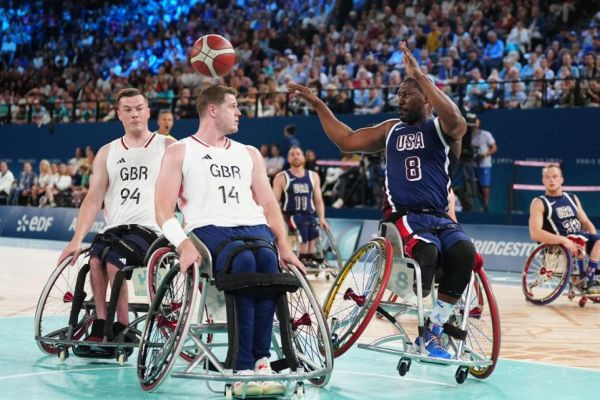USA Dominates Great Britain in Men's Wheelchair Basketball: A Comprehensive Analysis
The rivalry between the United States and Great Britain in men's wheelchair basketball is one of the most storied and fiercely contested in the sport's history. These two powerhouse nations have consistently ranked among the top teams in the world, boasting a wealth of talent, dedication, and tactical prowess. The latest chapter of this rivalry, in which the USA dominated Great Britain, serves as a testament to the growing strength and influence of American wheelchair basketball and highlights the areas where the British team fell short.
Historical Context: The Rivalry
To understand the significance of the USA’s domination over Great Britain, it’s important to place the match within the broader context of their rivalry. For decades, both nations have produced world-class athletes and claimed numerous titles in international wheelchair basketball competitions. The United States has a long and successful history in the sport, having won several Paralympic and World Championship gold medals. Great Britain, while historically not as dominant as the USA, has seen significant growth over the past two decades, culminating in multiple medals in Paralympic Games and European Championships.
Heading into the match, the teams were ranked closely in international standings, each boasting key players with significant experience and skill. Great Britain, known for its disciplined defense and patient ball movement, was expected to give the USA a tough challenge. On the other hand, the United States is renowned for its athleticism, fast-paced offense, and ability to adapt to changing game situations.
Pre-Game Expectations: A Clash of Styles
The anticipation for the game was palpable. Great Britain, led by seasoned veterans like Terry Bywater and Gregg Warburton, had built a reputation for methodical and efficient basketball, with a particular focus on strong half-court sets and impenetrable defense. Their ability to control the tempo of the game was expected to be a key factor in countering the more aggressive, transition-heavy playstyle of the USA.
The American team, under the leadership of coach Ron Lykins, was viewed as a more dynamic and explosive unit. Players like Steve Serio and Matt Scott were expected to lead the charge, utilizing their speed and versatility to force Great Britain out of their comfort zone. The USA’s strength lies in their depth, as they boast a roster filled with players capable of contributing on both ends of the floor. This depth, combined with their fast-break capabilities, made them the favorites to impose their will on the game.
The Game: USA's Tactical Brilliance
From the opening tip, it became clear that the USA had come prepared with a game plan to dismantle Great Britain’s methodical approach. The Americans immediately established a fast pace, pushing the ball up the floor at every opportunity. By capitalizing on their superior speed and athleticism, the USA forced Great Britain into uncomfortable defensive positions early in the game.
Matt Scott, one of the USA’s standout performers, set the tone with his relentless pressure on the ball and ability to create scoring opportunities in transition. His quickness off the dribble and ability to find open teammates was a key factor in the USA’s early lead. Steve Serio, a veteran and one of the world’s best wheelchair basketball players, orchestrated the offense with precision, making sure the ball movement remained fluid and that players were in optimal scoring positions.
The American defense was just as impressive. Knowing that Great Britain thrives on half-court sets, the USA applied intense full-court pressure to disrupt their rhythm. The British team struggled to find open shots, as the USA’s defense was relentless in closing down passing lanes and contesting every shot. Great Britain’s inability to settle into their offensive system resulted in turnovers, which the USA capitalized on, extending their lead throughout the first half.
Key Players: USA's Stars Shine Bright
Several key players contributed to the USA’s dominance in the game. Matt Scott and Steve Serio, as expected, were the linchpins of the team’s success. Scott’s combination of speed and court vision allowed him to consistently break down the British defense, while Serio’s leadership and poise under pressure ensured that the team remained focused and disciplined.
Jake Williams, another crucial player for the USA, provided a significant scoring boost off the bench. His outside shooting was instrumental in stretching the British defense, opening up driving lanes for Scott and Serio to exploit. Williams’ ability to knock down three-pointers at critical moments of the game further demoralized the British defense and made it difficult for them to mount any sort of comeback.
Defensively, Brian Bell and Josh Turek were standout performers. Bell’s physicality and mobility made it difficult for Great Britain’s big men to establish any sort of presence in the paint, while Turek’s defensive awareness helped to shut down Great Britain’s primary scorers. The USA’s ability to switch on defense, rotate quickly, and communicate effectively made them a nearly impenetrable unit, holding Great Britain to one of their lowest scoring outputs in recent memory.
Great Britain’s Struggles: What Went Wrong
Despite being one of the top teams in the world, Great Britain appeared outmatched from the outset. One of the primary reasons for their struggles was their inability to adapt to the USA’s pace. Known for their methodical, half-court style of play, Great Britain found themselves unable to keep up with the relentless transition game of the Americans. The full-court pressure applied by the USA disrupted Great Britain’s usual offensive sets, leading to turnovers and rushed shots.
Terry Bywater and Gregg Warburton, two of Great Britain’s most reliable scorers, were effectively neutralized by the USA’s defense. Bywater, in particular, struggled to find his rhythm, as the USA’s aggressive perimeter defense limited his opportunities to score from outside. Warburton, known for his playmaking abilities, found it difficult to penetrate the USA’s defense and was forced into taking difficult shots throughout the game.
Additionally, Great Britain’s defense, which is usually a strength, was unable to contain the USA’s dynamic offense. The speed and ball movement of the Americans consistently forced the British defense to rotate, leading to open looks for the USA’s shooters. Great Britain’s inability to match the USA’s athleticism in transition also led to several fast-break points, further widening the gap between the two teams.
The Final Score: A Statement Victory for the USA
The final score of the game reflected the USA’s complete dominance: 73-69. The 4-point margin of victory was a clear indicator of how well the USA executed their game plan and how thoroughly they outplayed their British counterparts. It was a statement victory for the American team, reaffirming their status as one of the top wheelchair basketball nations in the world.
Implications for the Future
The USA’s victory over Great Britain has significant implications for both teams moving forward. For the Americans, the win solidifies their position as a dominant force in men’s wheelchair basketball. The depth, athleticism, and tactical brilliance they displayed in the game will undoubtedly make them one of the favorites in future international competitions, including the Paralympic Games and World Championships.
For Great Britain, the loss serves as a wake-up call. While they remain one of the top teams in the world, this defeat highlights the areas where they need to improve. Adapting to faster-paced opponents, finding more scoring options outside of their key players, and tightening up their defense in transition will be crucial if they hope to compete at the highest level.
Conclusion
In this latest chapter of the USA-Great Britain rivalry, the Americans were simply too strong, too fast, and too disciplined for their British counterparts. The USA’s tactical execution, combined with the outstanding performances of their key players, ensured a comprehensive victory that reaffirms their place among the elite in men’s wheelchair basketball. As both teams look ahead to future competitions, the lessons learned from this game will undoubtedly shape their strategies and aspirations on the international stage.



